Elizabeth Winthrop's Blog
December 10, 2022
What Comes After the Book Launch?
So here I am on the other side of the first round of book launch events. How do I feel? A trifle overwhelmed, fighting a cold that’s turned into bronchitis, and deeply touched by the honest and positive responses to my memoir. Always before, I’ve hidden behind my characters when voicing my feelings. I’ve spoken in their thoughts and through their words and actions. This time, I brought my full self to the page, and it’s been both an exhilarating and a slightly unnerving experience. But what I’ve heard again and again is what I wanted to hear: You brought your mother to life, and you kept the focus on her. You told her story honestly. You were tough on yourself too.
I am grateful to so many of you who’ve bought the book, attended one of my events, interviewed me on a podcast, thrown me a party, written a review, or emailed me directly with your thoughts and reactions. Once again, here are ways you can order the book in case you think it might make a lovely holiday present. Barnes and Noble, Bookshop.org, Politics and Prose, RJ Julia Books, Regal House Publishers, Amazon, and in the UK. And if you’d like signed copies, just email me and we’ll make that happen.
Here are some pictures from a few of my events. Although Evan Thomas, my gracious conversation partner at Politics and Prose, voiced doubts about me doing a reading, I insisted and, in the end, I made him laugh.

My daughter gave me a Washington, D.C. party complete with a remarkable and delicious cake.

In Middletown, Connecticut, I had a fascinating conversation with Jesse Nasta, a Wesleyan history professor and the director of the Middlesex County Historical Society. My whole family is buried in the Indian Hill Cemetery on the hill above Middletown and before our conversation, Jesse showed slides detailing the long history of the Alsops in the town.
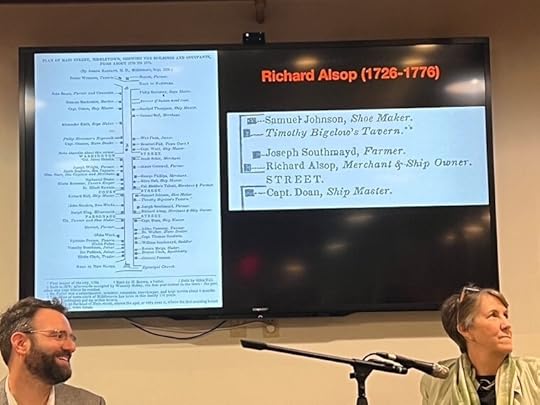
And I had a lovely, candid conversation with my dear friend, Tim Gunn at the New York Society Library about growing up in cold war Washington, an experience we share and have discussed often over breakfast at our local diner.
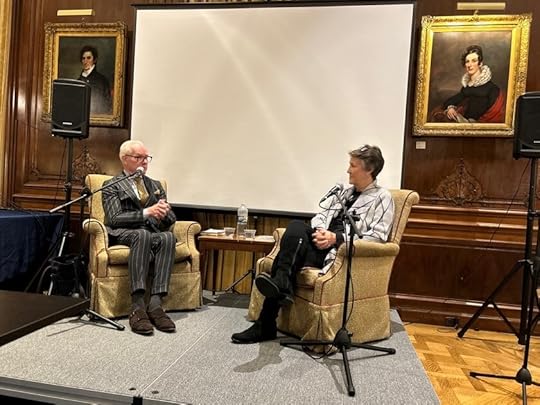
So what’s next? More events on the east coast and in Florida in the months to come. You can check them out on the events page of my website and on this page, read some of the columns I’ve written or listen to interviews I’ve done about various aspects of the memoir from the historical focus to the caregiving stories.
But first and foremost, I’m a writer and for the most part, writers write alone. In these past weeks, I’ve felt surrounded and buoyed up by the company of readers like yourselves, responding to my story. My usually quiet study is full of your voices, and I am grateful for them. And I’m always delighted to meet with book clubs whether in person or by Zoom. Check out the book club page on my website if you are interested.
However, as I quote in my TEDx talk, entitled Risking Exposure: The Creative Life, Cheryl Strayed captures the creative anxiety building in my head when she says, “There is an ache inside me that is only soothed by writing.” Soon I will turn away from writing about a book which is what publicity demands to writing a book which is what my inner self is demanding.
October 18, 2022
The Big Ask
Dear Friends and Fellow Readers,
For months now, I’ve been entertaining you with stories from my upcoming memoir, Daughter of Spies. I’m hoping these have whetted your appetite for the book itself due out on October 25th, one week from today. That’s THE PUBLICATION DAY, the moment when the memoir finally becomes widely available in bookstores and online.
I know many of you have already pre-ordered the book for which I’m deeply grateful. This newsletter is the big ask.
My events page has it all. Please spread the word on social media and to your friends by word of mouth. Please recommend it to your book club as I love speaking to groups of interested readers.
And here’s the event that you can all attend by Zoom if you don’t live in New York.
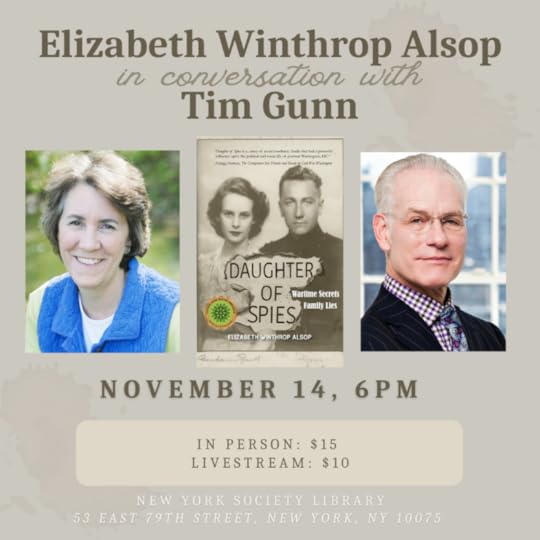
Everybody is asking, Why Tim Gunn? It certainly will not be a discussion of my fashionable outfits. His father was number 2 at the FBI under J.Edgar Hoover and his mother was a librarian at the CIA. Soon after we met in our local diner, we discovered how entwined our family roots are. We went to the same elementary school (he’s younger than I) and grew up five blocks from one another. We’re pretty sure his father wrote the report on my uncle, a closeted homosexual entrapped by the KGB in a “kompromat” in Moscow in 1958. So we both grew up in the murky underworld that was 1950s Cold War Washington and know many of the same characters from that era. It should be an interesting conversation. Tim has written many books, but this Kindle Single, Shaken, Not Stirred speaks to those times in an honest and elegant way. Although I can proudly lay claim to five brothers, I’ve appointed him my honorary sixth.
Thank you all so much for whatever you can do especially in these busy weeks before the midterm elections. I have a feeling the question I might be asked most often in the days ahead is what would your father and uncle feel about the current political situation in America? More than any other time in our history, I wish they were here to answer that question themselves.

October 1, 2022
Why I love to Talk to Book Clubs
I once took the Meyers Briggs personality test and although I can’t recall the exact results, I do remember that I landed right on the line between introvert and extrovert. I treasure my quiet creative time, but I also love to introduce my books to readers and hear their responses to the worlds I’ve created.
In the days when I traveled to promote my novels for children, I often gave three power point shows a day, took questions and signed hundreds of books. Except for the travel itself, I loved getting out of my study and talking to readers of all ages. Often, I would be placed on the stage in an auditorium in front of as many as 500 middle schoolers. I learned very quickly that silence was my best friend. The audience chatter, the squeak of folding chairs, the buzz of settling bodies soon quieted when it was clear that I had no intention of saying a word until I had complete silence. For a familiar adult like a teacher or principal, that might not have worked. But for this unknown, unpredictable author, it was a time-tested tool. And I never hesitated to use it.
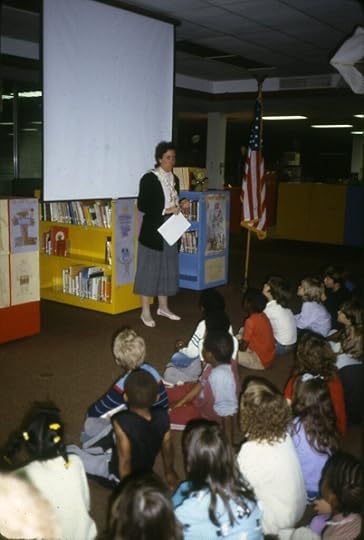
With the introduction of Skype and Zoom, I’ve learned that a school appearance can be less programmed and more spontaneous. When it comes to the Q and A, students will ask questions like these:
“Can you show us the view from your study window?”
“Who’s that in picture behind you?”
“How far is it from your bed to your desk?”
“Why is your desk so messy?”
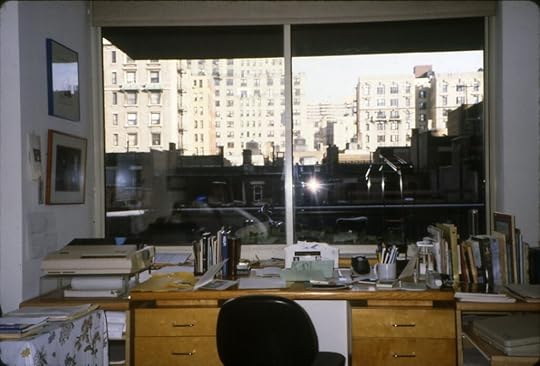
And all along, I have met with book clubs, often in person and now, just as often, by Zoom. Book club members can be a bit mystified by my approach. We all settle into our chairs, in somebody’s living room or each of us in our spaces looking at one another on screens. The members sit back, expecting me to start the discussion. But as I explain to them right away, I’m there to listen. What could be more helpful and energizing for a writer than to listen to readers who have just finished her book, discussing what they liked or didn’t, which character appealed to them, and which drove them crazy? I want my audience to forget I’m there and often, if I stubbornly keep my mouth shut and wave away their questions, they do. And that’s when the discussion heats up and I learn what they really think.

“It drove me crazy that Anna didn’t just leave the island straight away. Why did she take Erin shopping in that mall?”
“I get it. They hadn’t been off the island in months.”
“But she must have known her husband would follow her.”

Buy Counting on Grace on Amazon
“Grace’s mother was nasty. How could she have ripped up that one photograph of her daughter? And why did she push her so hard in the mill?”
“What choice did she have? If Grace didn’t keep the spinning frame running, they would all have been thrown out of mill housing.”
When people ask if I like to meet with book clubs, I respond with an enthusiastic YES. Bring it on.
You can go here to find my website page for book clubs who wish to discuss any of my books, but most especially my new memoir, Daughter of Spies: Wartime Secrets, Family Lies, and here you’ll find a list of suggested discussion questions.
September 30, 2022
Book Clubs
I’m so glad you landed on this page. I have long enjoyed meeting with book clubs to discuss my novels for adults and children and now, with my first memoir, I’m eager to hear once again what my readers think. At the moment, unless your book club meets within 30 miles of New York City, I will be accepting requests for Zoom/Skype meetings only. I don’t charge a fee for the great privilege of meeting with my readers, so the only obstacle might be a busy schedule of appearances and deadlines. No matter what, we will find a time. Please fill out the contact form below. I very much look forward to being in touch and to meeting you and your circle of committed readers.
You might also be interested in downloading this discussion guide for Daughter of Spies.
September 14, 2022
My Mother and the Queen
Although of course, it was expected, I was especially sad to learn of Queen Elizabeth’s death. She and my mother were born three weeks apart. My mother, a British war bride raised in Gibraltar, the child of a “crown colony,” revered the queen and the monarchy in general. In 1936, the whole family turned out with the rest of the British citizens in Gibraltar for the Silver Jubilee of King George V. My grandfather was dressed in top hat and tails and my mother in her Brownie uniform. Even the dogs had bows tied around their necks.
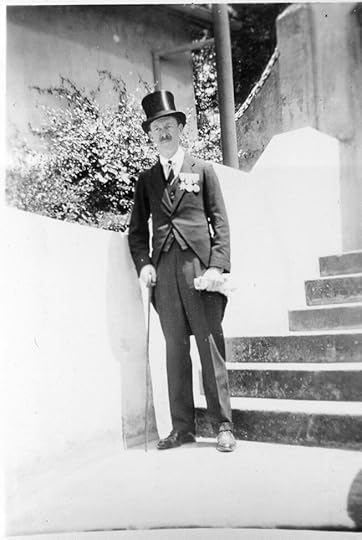 Arthur Hankey in top hat and tails
Arthur Hankey in top hat and tails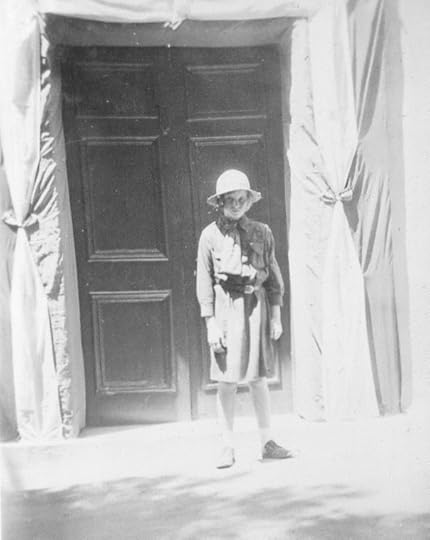 Tish in her Brownie Uniform
Tish in her Brownie Uniform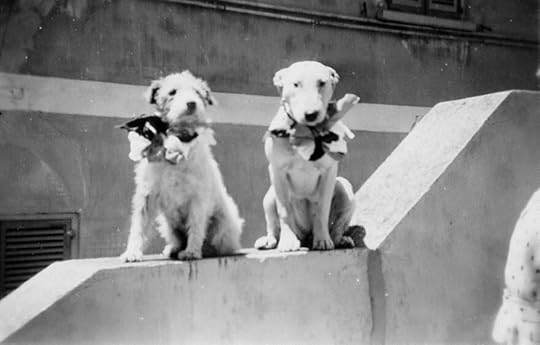 Two dogs in bows
Two dogs in bowsI always told people that I was named Elizabeth after the queen. In fact, it turned out I was named after my great grandmother on my father’s side because I was born the same day 101 years later. However, my mother never contradicted me when she overheard me boasting I was a namesake of the queen.
My father was rejected by the American Army as he had high blood pressure and asthma. As a result, in April 1942, he joined 17 other Americans who had enlisted in the King’s Royal Rifle Corps, a British regiment raised originally in America to fight in the French and Indian War . He fought with the British in Italy in late 1943 and early 1944 before transferring to the American Army to drop behind enemy lines into France in the months after D-Day.
In 1955, on the two hundredth anniversary of the founding of the regiment, the American recruits were invited back to England for a ceremony during which they were to meet Queen Elizabeth and Prince Philip. In this picture, my mother is the one in white gloves which she knew were required to shake hands with the queen
From Daughter of Spies, to be published October 25th:
In the photograph, my mother is dressed in a simple black suit with pearls at her throat, an outfit almost identical to the queen’s white dress. She looks slim, calm, and chic, her white-gloved hands folded in front of her. You can tell that the queen is speaking directly to her; other people in the line are leaning out to listen, and although the queen is smiling brightly, my mother looks solemn and attentive, but not overly impressed. She’s British, after all, and unlike the Americans on either side of her, she is at ease with the idea of royalty. Born only a month apart, these two young mothers (Charles and I were born the same year, the queen’s first child, my mother’s third) with their identical hemlines, two-inch heels, and pins on their lapels, look as if they could easily have been friends.
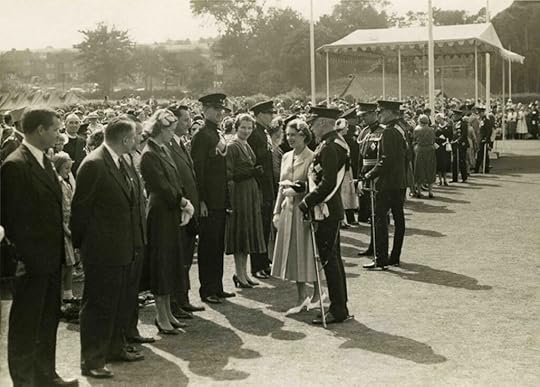 Photograph used by permission of the Celer and Audax Club of the King’s Royal Rifle Corps
Photograph used by permission of the Celer and Audax Club of the King’s Royal Rifle Corps
August 6, 2022
A Wicked Child
Alice Roosevelt Longworth and Me
Alice Roosevelt Longworth was the wild child of President Theodore Roosevelt and because we are distantly related and she loved a good gossip, I was often invited to have tea with her on Thursday afternoons. As a budding writer, I was an incurable eavesdropper.
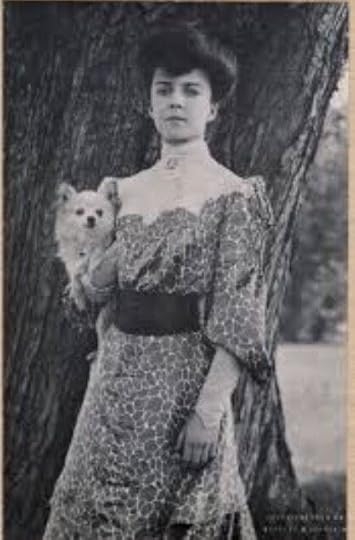
Alice entered the White House as a rambunctious 17-year-old party girl. She publicly smoked, drank and caroused with men. She allegedly jumped into a swimming pool fully clothed while on a diplomatic mission to Japan.
She had a contentious marriage to Republican Congressman Nicholas Longworth, but it was common knowledge that her only daughter was fathered by Senator William Borah.
Her exasperated father said that “I can either run the country or I can attend to Alice, but I cannot possibly do both”.
I adored her especially because I was a timid little girl, the farthest thing from a wild child which is what I really wanted to be.
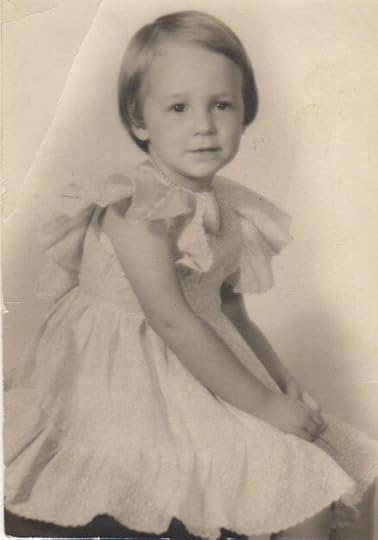 Me in what I called my butterfly dress
Me in what I called my butterfly dressAnd she loved my company because I had a good ear for the kind of tale I heard around my parents’ dinner table that she wanted to hear.
 Mrs. L (as we called her) with her famous pillow
Mrs. L (as we called her) with her famous pillowSo imagine my delight when recently, I learned from Michael Cullinane*, a historian in England, that he had just transcribed an interview with Alice in which she talks about me.
Apparently when I was only six years old, I picked up on her faux English accent which she herself admitted sounded “absurd” in 20th Century America, so she was especially amused when I imitated her. She declared that she thought I was a prim little girl, but when I turned around and repeated her exact words with her odd inflection, she roared with laughter and declared me to be a wicked child. She went on to say that “we became the kind of friends that have never been: we laughed until we cried.”
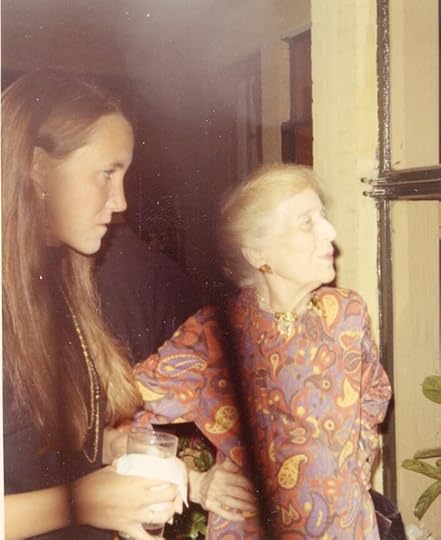
I have no memory of this encounter, but it does help explain why I loved her company and leapt at every chance to spend time with her. And all these years later, I’m pleased that she had bestowed on me her highest compliment… I too was a wicked child.
*Remembering Theodore Roosevelt: Reminiscences of his Contemporaries by Michael Cullinane
July 2, 2022
What I Learned from My Father
In the early days of writing Daughter of Spies, my memoir that will be published in the fall, I was convinced that I could write equally about both my parents, but as I detailed in another blog post, the writer William Zinsser proved me wrong. When he told me that I had to choose one of my parents as the focus of my story, I didn’t believe him. But in the end, I chose my mother and much of the fascinating bits and pieces I’d unearthed about my father’s childhood, his checkered college career as well as his war history had to end up on the cutting room floor.
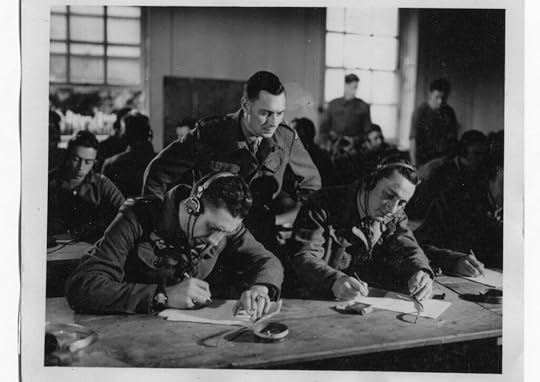 Stewart Alsop during OSS training before parachuting into occupied France, 1944.
Stewart Alsop during OSS training before parachuting into occupied France, 1944.The books written about my father detail his travels, his columns, and the stories he broke. But in writing the memoir, I didn’t focus on my father’s interview subjects or the political intrigues of cold war Washington. I was much more interested in the emotional landscape of our family. However I did briefly consider following in his journalistic footsteps, and so spent one college summer interning with the Berkshire Eagle in western Massachusetts.
I replaced the reporters who went on vacation, so I filled in as court reporter one week, obituary writer the next, society columnist the third and so on. In addition, I was encouraged to submit articles for Berkshire Week, the newspaper’s weekend insert.
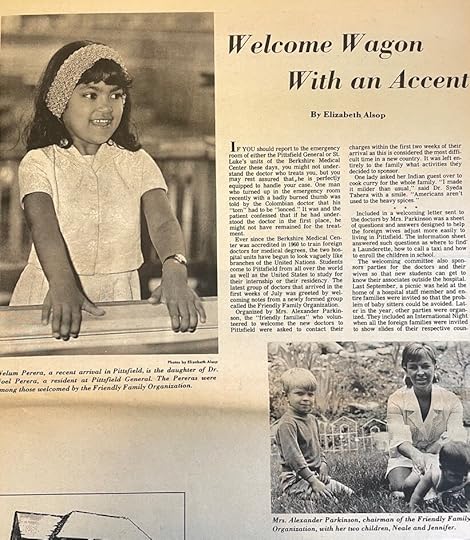 One of my early articles for the Berkshire Eagle. I also took the pictures
One of my early articles for the Berkshire Eagle. I also took the picturesFor the most part, it was a job I really enjoyed and at the end of the summer, I knew it was a career I didn’t want. I came away eager to return to my fiction writing, believing incorrectly, that if I created characters from my imagination, I would have more control over them than over people whose stories ended up, for good or bad, in the newspaper. Once again, I was wrong. The more you try to control fictional characters, the more quickly your story dies on the page.
I learned many lessons about writing from my father from using the simplest language to relying on concrete details and active verbs in my descriptions, but I think the most important takeaway was the need for meticulous, detailed research. Although others referred to him as a journalist or a columnist, he always called himself a reporter. No wonder the title he and his older brother, Joe, chose for their weekly newspaper column was Matter of Fact.
 Stewart Alsop interviewing Americans for an article called The Mood of America
Stewart Alsop interviewing Americans for an article called The Mood of AmericaSaturday Evening Post, September 1962. Used with permission
He would spend weeks and sometimes months preparing for a trip abroad or polling Americans about their lives and their concerns or traveling widely to understand on a deeper level his interview subjects and their backgrounds. He took notes in small spiral-bound pads which he kept all over the house. Much of his research never ended up in the articles he wrote, but what he’d learned always informed the piece.
In writing fiction, I use research in the same way. Know everything you can about your subject so that when you bring your characters onstage, the reader will sense the depth and bulk of the iceberg, even when you only give them the tip.
May 29, 2022
Naming My Brand
My publicist suggested to me recently that I identify my brand. The suggestion stumped me. Frankly, I associate the word “brand” with pet food or soup or cigarettes rather than with a person who writes books for a living. But I am catching up with all the lingo and with what it takes to get a book out there into the hands of readers. She helped me with this follow up question. What does a reader expect when they pick up one of your books? Even though I write for all ages from toddlers to baby boomers, some of the same qualities drive my books. First, I start with character. A person saunters into my mind or across my field of vision and I begin to wonder who she is. Even a photograph stirs my writer’s brain. This photo that the great child labor photographer, Lewis Hine, took of little Addie Card in a Vermont textile museum stopped me in my tracks. Who is she? Where did she come from? Why is her hair tied up like an old woman’s? She doesn’t even have shoes. What happened to her? The story starts.

Readers who pick up my books will find characters in trouble. Complicated lives drive plot. How could this little girl who I called Grace get out of that mill? Then comes research if it’s fiction set in history. About research I always say, the writer needs to know the iceberg but only needs to give the reader the tip. The reader will trust the story if she senses what’s beneath the surface, what doesn’t need to be spelled out.
Some of the research involves setting which means I need to visit the place where I’m setting the story. For my memoir, Daughter of Spies: Wartime Secrets, Family Lies, I wanted to try and see every place where my British born mother had lived during her childhood. So I traveled to Gibraltar where she was born

and on another trip, to Ware, England where my mother at the age of 13,

was sent to Catholic boarding school
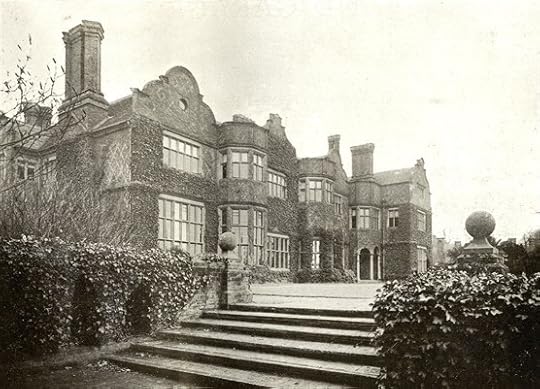
and to the Scottish moors where she spent summer holidays and to London,

where she worked as a decoding agent for MI5.
And in all my books, family dynamics move the story and the characters. This was true in my fantasy novel, The Castle in the Attic, where William, the 10-year-old protagonist, will do anything at all to keep someone he loves from leaving him.
 Original Hardcover illustration by Trina Schart Hyman
Original Hardcover illustration by Trina Schart HymanIt was true in Counting on Grace where Grace’s mother is happy to keep her working in the mill while Grace fights to get out and on with her life.
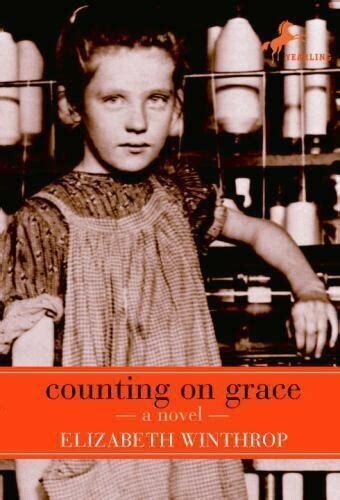
And it’s certainly true in Daughter of Spies, where I had to mine my own family history to understand why my mother and father kept so many secrets not only from me and my brothers, but from each other.

I learned that in writing memoir, I could use all the writing tools I’d sharpened in my fiction writing, from dialogue to structure to character development to setting, but this time, I had to use those tools to make sense of my own story.
So what is my brand? I’m a prolific writer for readers of all ages. I write deeply researched stories that explore family bonds across generations, stories that are driven by character and that are set in places I’ve come to know well, be they around the corner or across the ocean.
April 21, 2022
When Your Characters Take Charge
I’m working on the Prequel to my fantasy series which started with The Castle in the Attic, a book I published in 1985 about a ten-year-old boy named William and his trip back in time to rescue his beloved nanny, Mrs. Phillips.
 Original Hardcover illustration by Trina Schart Hyman
Original Hardcover illustration by Trina Schart HymanAlthough almost finished with a first draft of this Prequel, I feel myself resisting the next scene. Why? Because I’ve created two characters that I know my main guy, Richard, must leave behind in 1366 when he travels back to his own time, 1943 on the coast of Northumberland.

Richard dreads saying goodbye to Sonia and Eve, and so do I.
I never knew they were going to join me on this adventure, but at the beginning of the pandemic, when my twin granddaughters were finishing the spring semester of fifth grade, they didn’t have enough to do. Their school hadn’t figured out how to use Zoom effectively and so they were left with time on their hands. I hired them as my research assistants and promised them a cameo in the book if they did a good job. Sonia re-read The Castle in the Attic and took notes to help me with continuity while Eve did the same with the sequel, The Battle for the Castle.

Then they read as much of the first draft of the Prequel as I’d written and critiqued the manuscript. Finally, I gave them each specific research jobs which required digging into subjects as varied as the horses and saddles a knight would use for a tournament to a list of the household staff required for an imposing 14th Century castle. We negotiated their wages one week and the next, they said they would work for free as $5 a week per person put too much pressure on them. They kept their end of the bargain and I kept mine. I put them in the book, thinking they would have nothing more than a cameo appearance.
If there’s one thing a novelist learns over time, it’s that you’re not in charge, your characters are. These two strutted on the stage and refused to leave. Now, they are, along with others, so deeply embedded in my psyche, and I identify with them so completely that in fact, I too am living six hundred years ago. When the news of the world in our present day is too hard for me to absorb, I know that I can disappear into the Middle Ages where the plague is behind them and the War of the Roses ahead, and all I need do is get my character back through the portal to his own time while making sure nobody else tags along.
Not even Eve and Sonia.
I promised myself I would never post a recognizable photo of my grandchildren on any kind of social media, so here is one of my favorite images of these two, just starting off in life and meeting it headlong.
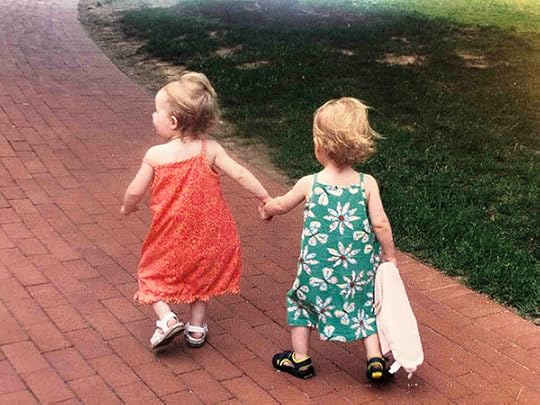 Photo credit: Donna Erikson
Photo credit: Donna Erikson
April 15, 2022
When Your Characters Take Charge
For years, like many children’s book writers, I toured around the country speaking to students and teachers. I’m working on the Prequel to my fantasy series which started with The Castle in the Attic, a book I published in 1985 about a ten-year-old boy named William and his trip back in time to rescue his beloved nanny, Mrs. Phillips.
 Original hardcover illustration by Trina Schart Hyman
Original hardcover illustration by Trina Schart HymanAlthough almost finished with a first draft of this Prequel, I feel myself resisting the next scene. Why? Because I’ve created two characters that I know my main guy, Richard, must leave behind in 1366 when he travels back to his own time, 1943 on the coast of Northumberland.

Richard dreads saying goodbye to Sonia and Eve, and so do I.
I never knew they were going to join me on this adventure, but at the beginning of the pandemic, when my twin granddaughters were finishing the spring semester of fifth grade, they didn’t have enough to do. Their school hadn’t figured out how to use Zoom effectively and so they were left with time on their hands. I hired them as my research assistants and promised them a cameo in the book if they did a good job. Sonia re-read The Castle in the Attic and took notes to help me with continuity while Eve did the same with the sequel, The Battle for the Castle.

Tell the story of your 18-year-old pregnant mother crossing the North Atlantic in convoy dodging U-boats in December of 1944.Then they read as much of the first draft of the Prequel as I’d written and critiqued the manuscript. Finally, I gave them each specific research jobs which required digging into subjects as varied as the horses and saddles a knight would use for a tournament to a list of the household staff required for an imposing 14th Century castle. We negotiated their wages one week and the next, they said they would work for free as $5 a week per person put too much pressure on them. They kept their end of the bargain and I kept mine. I put them in the book, thinking they would have nothing more than a cameo appearance.
If there’s one thing a novelist learns over time, it’s that you’re not in charge, your characters are. These two strutted on the stage and refused to leave. Now, they are, along with others, so deeply embedded in my psyche, and I identify with them so completely that in fact, I too am living six hundred years ago. When the news of the world in our present day is too hard for me to absorb, I know that I can disappear into the Middle Ages where the plague is behind them and the War of the Roses ahead, and all I need do is get my character back through the portal to his own time while making sure nobody else tags along.
Not even Eve and Sonia.
I promised myself I would never post a recognizable photo of my grandchildren on any kind of social media, so here is one of my favorite images of these two, just starting off in life and meeting it headlong.Tell the story of your 18-year-old pregnant mother crossing the North Atlantic in convoy dodging U-boats in December of 1944.
 Photo credit: Donna Erikson
Photo credit: Donna Erikson



